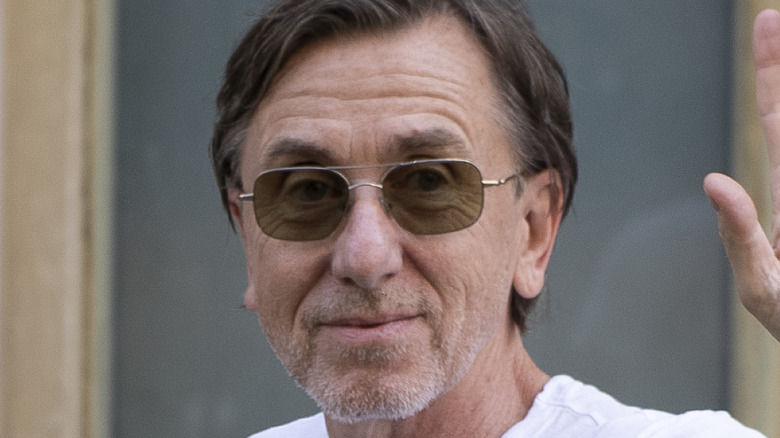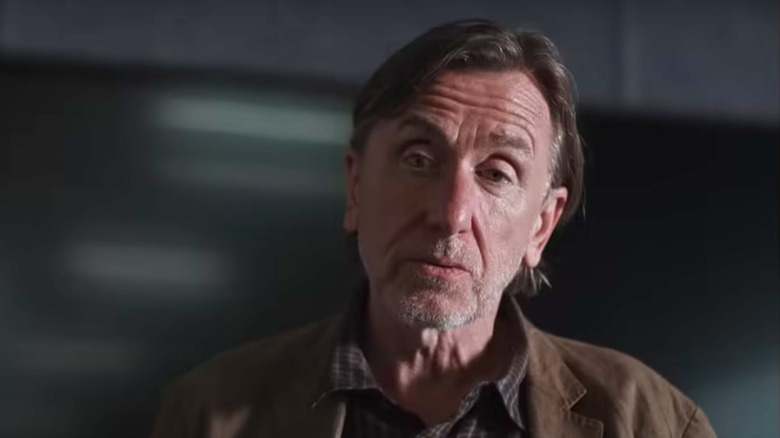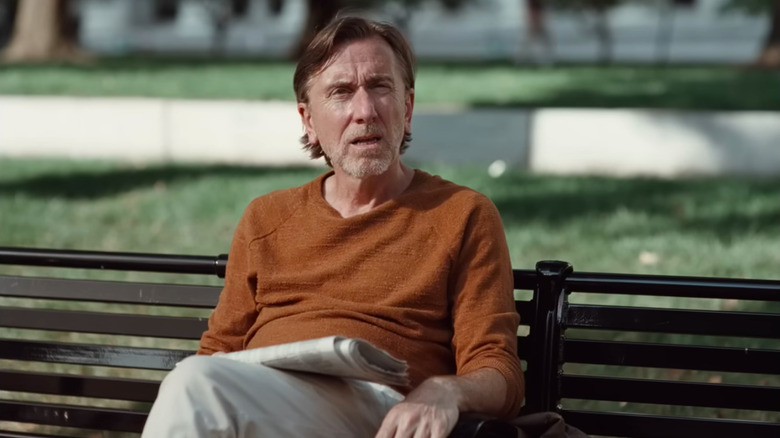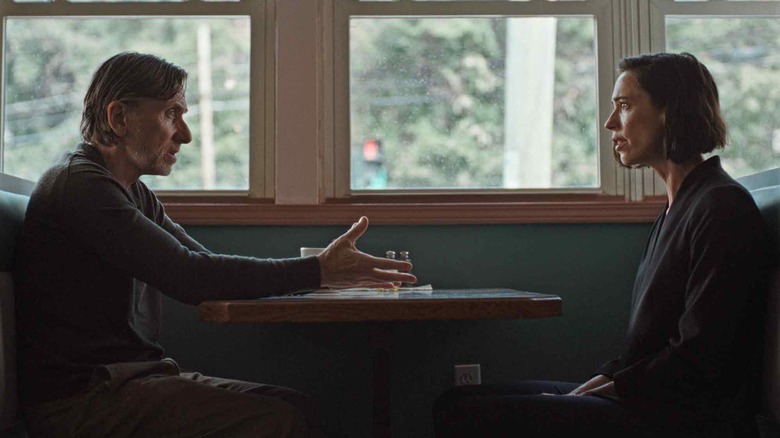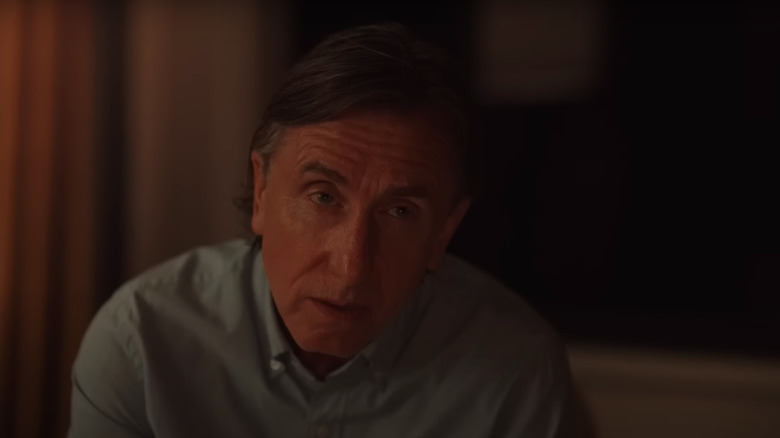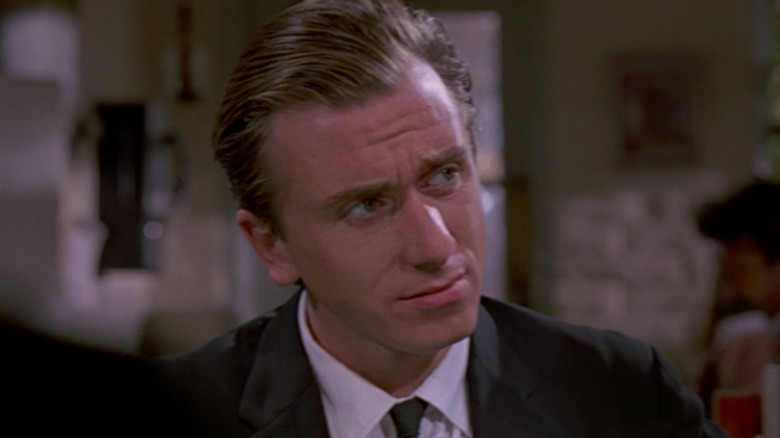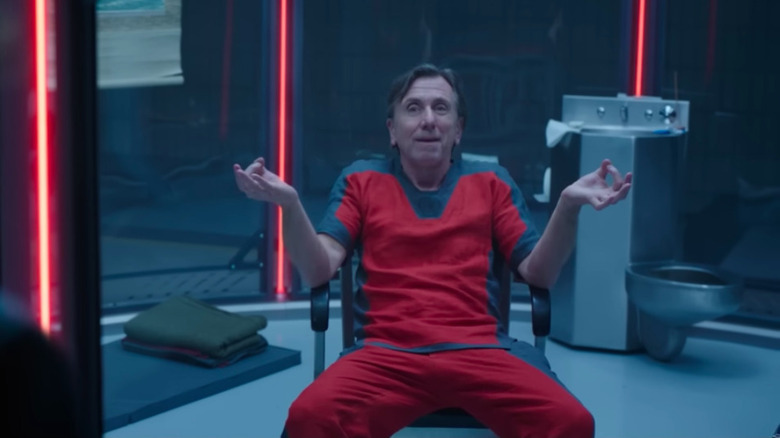Tim Roth Talks Starring In The Horror Film Resurrection, Collaborating With Quentin Tarantino, And More - Exclusive Interview
Throughout his four-decade career, Tim Roth has proven he's one of the most interesting actors working in film and TV. A frequent collaborator of Quentin Tarantino with memorable roles in the director's "Reservoir Dogs," "Pulp Fiction," and "The Hateful Eight," Roth fully embodies every character he takes on, from the daffy but tragic Guildenstern in "Rosencrantz and Guildenstern Are Dead" to the diabolical aristocrat Archibald Cunningham in "Rob Roy." He's also made his mark on the Marvel Cinematic Universe as Emil Blonsky/Abomination in 2008's "The Incredible Hulk," a character he's reprising in the upcoming series "She-Hulk."
Even with such a diverse filmography, Roth's never played anyone quite like David, the unwelcome blast from the past who reappears in the orderly life of Rebecca Hall's Margaret after 20 years in the psychological horror film "Resurrection." The movie has a mind-scrambling plot that'll keep viewers guessing, but Hall and Roth ground the movie in real emotion, and watching the pair go toe to toe is a real treat right up until the film's bonkers finale.
In an exclusive interview with Looper, Roth discussed his work in "Resurrection," his longtime partnership with Quentin Tarantino, and the connection between his latest film and his role in the MCU.
The reason Roth signed on for Resurrection
Why did you want to be part of "Resurrection"?
My son told me to be. I was traveling. I just finished working with [the] Marvel gang, and then I had to go straight to Cannes. My boy — Cormac — came with me, and we had a quick stopover in Paris, and this script landed and I had to sit down and read it. I was like, "Okay, what is this?" I told him about it. He said, "Give it to me." I gave it to him and he read it and said, "Yep, you're doing that. No worries." And that was it.
I had literally no say in the matter. Another one of my sons as well, when he heard who the people were that were involved and all of that stuff and read it again, he's like, "Oh, no, you're doing this." They're like that. There's a script I've just read that I'm apparently doing. They're making sure. There are certain things that I have no say over, and this was one of them.
It's good that they're looking out for you that way.
Apparently. It's working. Also, from my perspective, I love always the idea, and we're always looking for new filmmakers [like "Resurrection" writer and director Andrew Semans] and working with them. It's one of my favorite things to do, so that was my side of it.
Playing a character whose reputation precedes him
Before your character even speaks a word, he's been built up as this boogeyman. How did you approach that first scene to live up to this reputation that has preceded him?
When we sat and talked, me and Andrew [Semans], we discussed how the audience would see the character. My feeling was to go at it in the opposite direction and say it's a regular guy who knows [Rebecca Hall's character, Margaret] — doesn't know her initially, then knows her, then is an old friend of hers, then he was very close to her and all of these things. But [I wanted] to play it gently and to play it as a little bit put upon, a little bit nervous about her because she's behaving so weirdly.
Instead of coming out as a whispery bad-guy acting thing, go at it the other way. Go at it as someone who cares, someone dealing with someone who's a little bit in distress, whose behavior is a bit worrying. Then [there's] the idea that within a few syllables, in a sentence, you can turn him, and then the audience don't know what they're dealing with. You start with baiting them and her, and then you flip it. The idea is that she was right in the first place, and here it comes. But you play a double-edged sword with him all the way until he's busted — we have to be careful of spoilers right now.
Facing off with Rebecca Hall
Your and Rebecca Hall's characters are at odds throughout the film, rightly or wrongly.
Yeah. It's concerning to him — why is she doing this to him?
What was it for to work with her in that context, where in a lot of ways, it's her stalking your character?
Rightly so. I don't know. I found her to be such fun. Her sense of humor is full on. She's really good. She's proper actor material. Rebecca's the real deal, so you've got to be ready. You've got to really be ready.
We did all of that. We had all of that, but there were times when we would come to the end of the scene and we would burst out laughing, because [of] what we just did. We would get in there, we would do it, but you have to step back.
But there was also times when I would look; I'd be watching her and I'd have to be careful. When you're working with somebody who's that good, sometimes you're amazed by them, so you end up being the audience member while you're in the scene. You have to remind yourself you're there to do a job. You actually are there to do a job. She's such a remarkable [talent].
In that period, well, now I've worked with three women on films that are very low budget who [are] very powerful actors — just in recent history — one after the other. It's been an incredible ride. But with her, I had to watch it. I had to be on my toes, because sometimes you'd forget that you were there to actually engage because you're watching this incredible thing happen. It's pretty amazing.
Her performance is incredible.
Yeah. I was this close to it.
I can imagine that's really something.
Right? Isn't that incredible?
The fun of figuring Resurrection out
We know what Rebecca's character wants, but it's less clear what David wants. He's slippery. How did you understand his motivations?
It's something you do with the director, go to all the whys and the wherefores and all that stuff we decide, and then that's for us — so you're not allowed to know that. But we did; we had our game plan. We knew his motivations. We knew all of that stuff. But ostensibly, he's there to help her, and it's worrying the way she's behaving. He's brought her a gift, and he doesn't understand why she's being so ungrateful. Maybe she needs help reminding her that she should be grateful — so sick.
The movie is about a woman who's being gaslit, but did you view your character as a victim or a victimizer?
Oh, that's for you guys [to decide]. That's one of them. Listen, that is for you guys. That's what's interesting about the piece. I definitely had my opinion about it, that's for sure.
But no — what's interesting, and it is one of those things with the good new filmmakers, is that the audience goes on a journey and they work alongside us. They will be asking that question, "Okay, wait a minute. Does he ... Or is she ... " and so on. That's the fun of it. That's the game of it. If we answered all the questions and covered everything in music, so you knew what to feel, we wouldn't be getting anywhere.
One of the movie's big themes revolves around motherhood and how you keep your children safe. As a parent yourself, is that a theme that spoke to you?
Yeah, but from my side of it, as you know — spoiler alert — his personal motherhood is off on another planet somewhere ... I don't think he's a great parent. Let me say that: I really don't think he makes a great parent. I don't think he's good parent material. I think he thinks he is.
He's not really a parent. He adopted. He's a foster parent and he's been looking after someone else's child for ... Okay, spoiler alert.
Reminiscing about working with Quentin Tarantino
You've appeared in several of Quentin Tarantino's films. What do you enjoy about working with him that keeps you coming back?
Well, with him, it goes back to day one, and day one was getting the script [for "Reservoir Dogs"]. When he sent the script over, when he was brand new, when he was in that even ... What's Andrew [Semans] made, two? This is his second film. Quentin hadn't made one yet. This was the beginning for him.
There's this script that landed — it came from my agent. I was brand new. I'd just arrived in America and was heading out — didn't want to stay — and then got this script, read it, and went, "What?" I didn't even get through it. I was about 20 pages in, and I was on the phone going, "What is this? I want to do this."
That hasn't changed. The thing that's changed about Quentin is that he now has the experience that he didn't have. But in a way, he always had it. He'd been making films for a long time [in his head] before he made his first film. But his experience, his actual experience with the camera making his film, that was his first one.
I don't think he's changed. What we are looking at is somebody who's been given the space to make the films that he's always wanted to make, and his horizons are limitless.
He got to that position quickly. He got to make his choices about the stories he wanted to tell. "Pulp Fiction" came fairly quickly after "Reservoir Dogs," and then he was on a roll and has been since. We are whatever, for whatever. We wait as a gang. His actors — if you're lucky enough to consider yourself one of his actors — we wait for the phone to ring, and we hope it's going to.
You go, "Oh, it's so sad if you don't. There's nothing in there?" That's what happens. But it is the gang that he creates as he goes. He adds to that, this incredible stable of actors that he takes with him on these journeys.
He's an extraordinary filmmaker, but that's the first-time director ... and I've worked with many. It's been a thing that I've always wanted to do and still do, which is [working with] first-time, new talent, new storytelling. You never know. You might find another one.
The connection between She-Hulk and Resurrection
You're reprising your role as Abomination from "The Incredible Hulk" in "She-Hulk." Is there anything you can tease about your character's arc in the series?
I don't think I'm allowed to. I did it because it was really weird. I know that they're still working on it. It was really weird when they came to me and they said, "Would you fancy doing this?" I was like, "Yeah." Because originally, actually, there's a connection with "Resurrection." Originally, I did it for my kids. I thought, "Hilarious, dad's a monster." I thought, "It's cool," and they roll their eyes. "Resurrection" was the same ...
My kids decided that I was doing Marvel in the first place, because they existed. Now they make the choices. They make choices about my work because I don't know horror movies. I don't know that genre. I haven't done them, but they love it. They went, "Dad, you're doing it" [about "Resurrection"]. I made the call and there I am. That's kind of fun.
"Resurrection" is currently available in theaters and on-demand and will be coming to Shudder in November.
This interview has been edited for clarity.
